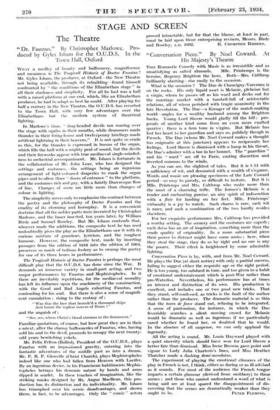"Conversation Piece." By Noel Coward: At His Majesty's Theatre
THIS Romantic Comedy with Music is as irresistible and as
unsatisfying as salted almonds. Mlle. Printemps is the heroine, Regency Brighton the hero. Both—Mrs. Calthrop brilliantly abetting—rise easily to the occasion.
What is the occasion ? The Due de Chaucigny-Varemies is on the rocks. His only liquid asset is Melanie, plebeian but a virgin, whom he passes off as his ward and decks out for the marriage market with a tumbril-full of aristocratic relations, all of whom perished with tragic unanimity in the late Revolution. The Duca Kreuger Of the match-making world—angles for a wealthy husband among the Brighton bucks. Young Lord Shcere would gladly fill the bill ;'• pro- posals of another kind come front an even more exalted quarter ; there is a firm tone in virgins. But Melanie has lost her heart to her guardian and says so, publicly though in French. The Due (whorl). Mr. Noel Coward makes a thought too enigmatic at this juncture) appears to reciprocate her feelings. Lord Sheere is dismissed with a lump in his throat, the Due's admirer with a bee in her bonnet. The "-guardian " and his " ward " are off to Paris, casting discretion and inverted commas to the winds.
As you can see, the slightest of tales. But it is told with a sufficiency of wit, and decorated with a wealth of eegance. Words and music are pleasing specimens of the Late Coward period—so easy to parody, so difficult to imitate. But it is Mlle. Printemps and Mrs. Calthrop who make more than the most of a charming trifle. The former's Melanie is a tender and enchanting gamine; an airy spirit of indiscretion with a flair for landing on her feet. Mlle. Printemps' virtuosity is a joy to watch: Such charm is rare, such wit is rarer, and such a combination of the two hardly resides elsewhere.
For her exquisite performance Mrs. Calthrop has provided a worthy setting. The scenery and the costumes arc superb ; each dress has an air of inspiration, something more than the crude quality of originality. In a more substantial piece their power to distract might have come amiss ; here, when they steal the stage, they do so by right and no one is any the poorer. Their effect is heightened by some admirable lighting.
Conversation Piece is by, with, and from Mr. Noel Coward. He plays the Due (at short notice) with only a partial success, failing to suggest either the requisite age or the right period. He is too young, too subdued in tone, and too given to a habit of emotional understatement which is post-War rather than pre-Waterloo. Nevertheless, his performance has at times an interest and distinction of its own. His production is excellent, and includes one or two good new tricks. That they stand, self-confessed, as tricks is the fault of the author rather than the producer.- The dramatic material is so thin that the tours de force stand out, refusing to be integrated. A scene of pantomime, for instance, in which . the Due feverishly searches a silent moving crowd for Melanie would be dramatic as well as ingenious if we particularly cared whether he found her, or doubted that he would. In the absence of all suspense, we can only applaud the ingenuity.
All the acting is sound. Mr. Louis Hayward played with a quiet sincerity which should have won for Lord Sheere a better fate than dismissal. Miss Irene Browne gave point and vigour to Lady Julia Charteris's lines, and Miss Heather Thatcher made a dashing demi-mondaine.
The experiment of playing the emotional climaxes of the play in French is not, I think, either as daring or as ill-advised as it sounds. For most of the audience the French tongue imparts a certain glamour (derived from snobbery) to these scenes ; and those who cannot understand a word of what is being said are at least spared the disappointment of dis- covering that the scenes are dramatically weaker than they
















































 Previous page
Previous page